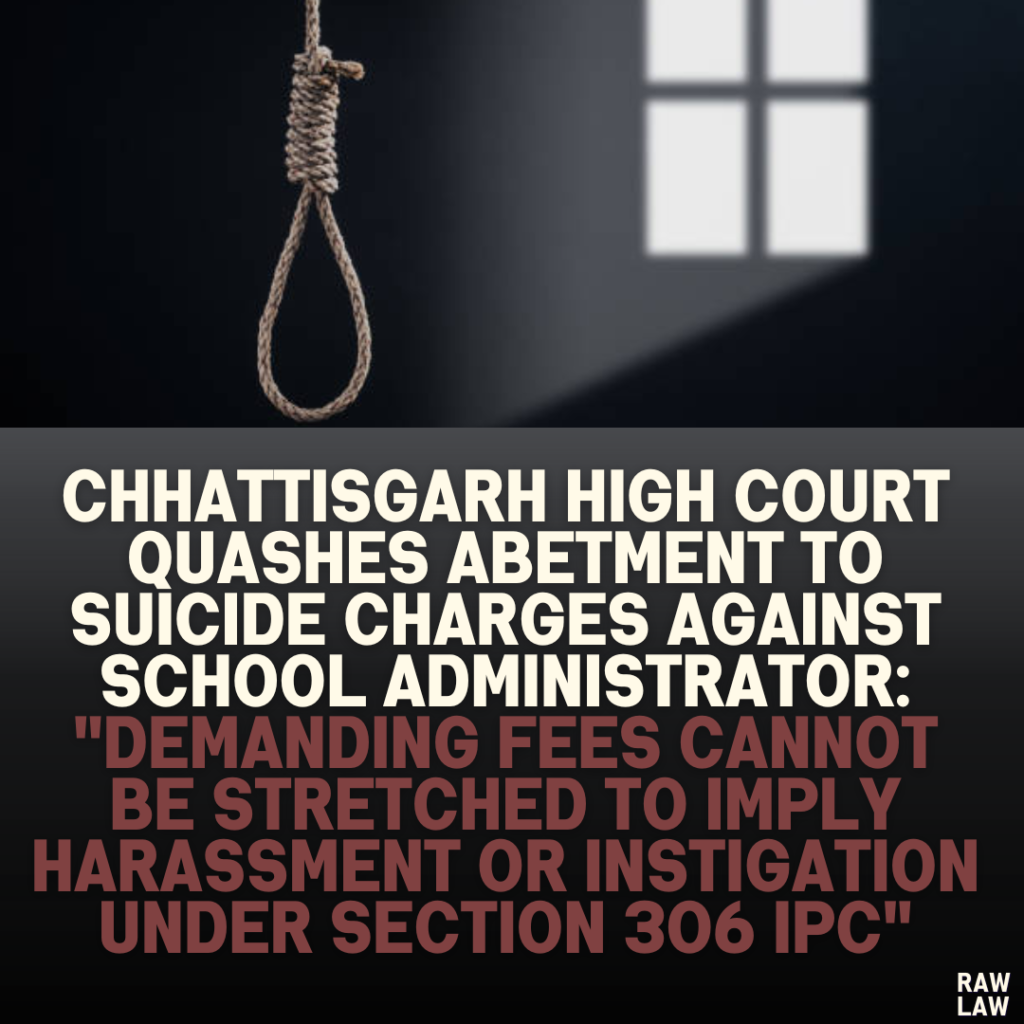Court’s Decision
The Chhattisgarh High Court quashed the charges framed by the Sessions Court, observing that the prosecution had failed to provide evidence showing a direct or indirect act of instigation or abetment by the applicant that led to the suicide of the deceased student. The court held that continuing the trial would be a misuse of legal proceedings and an undue burden on the accused.
Facts
- Incident: A Class 10 student attending Kamla Nehru Public Higher Secondary School allegedly committed suicide by jumping from the school building. She succumbed to her injuries on the same day.
- Allegation: The deceased’s family claimed that she was humiliated and scolded by the school administration for non-payment of fees, which drove her to commit suicide.
- Legal Proceedings: The FIR registered under Sections 306 and 34 IPC led to the filing of a chargesheet. The applicant, the president of the school’s managing body, was implicated based on allegations of harassment over unpaid fees.
Issues
- Was the applicant’s conduct sufficient to constitute abetment under Section 306 IPC?
- Did the evidence collected by the prosecution establish a prima facie case?
Petitioner’s Arguments
- No Involvement in Daily Operations: The applicant argued that he was not directly involved in the administration of the school or interactions with students.
- Absence of Evidence: There was no suicide note or direct complaints from the deceased linking him to harassment.
- Procedural Lapses: The defense pointed out that key statements and evidence from the inquiry conducted by the Block Education Officer were omitted by the prosecution.
- Supreme Court Precedents: The petitioner cited judgments emphasizing the necessity of a direct link between the accused’s actions and the alleged abetment.
Respondent’s Arguments
- Statements Under Section 164 CrPC: The prosecution argued that witness statements indicated harassment over unpaid fees, which could be considered abetment.
- Trial Court’s Discretion: It was submitted that the trial court had correctly framed charges based on prima facie evidence.
- Legal Threshold for Framing Charges: The prosecution argued that a detailed examination of evidence is unnecessary at the stage of framing charges.
Analysis of the Law
- Section 306 IPC (Abetment of Suicide):
- Abetment involves a mental process of instigation or intentional aiding of suicide, as defined under Section 107 IPC.
- The court reiterated that abetment requires proof of a direct or indirect act of instigation, conspiracy, or intentional aid.
- Judicial Precedents:
- In Netai Dutta v. State of West Bengal, the Supreme Court held that vague allegations or mere mentions of a person’s name are insufficient for abetment.
- In Geo Varghese v. State of Rajasthan, the court emphasized that mere harassment does not constitute abetment unless there is direct incitement or coercion.
- In S.S. Cheena v. Vijay Kumar Mahajan, the Supreme Court stated that abetment requires a clear mens rea and active acts that leave the victim with no choice but to commit suicide.
- Material Evidence:
- The court noted that the prosecution had failed to collect evidence of direct harassment, such as threats, humiliation, or severe actions, that could compel the deceased to take her own life.
- The deceased’s sister, who also studied at the same school, continued her education without incident, which weakened the prosecution’s argument of systemic harassment.
Precedent Analysis
The court analyzed several Supreme Court decisions to establish the threshold for abetment under Section 306 IPC. Key findings included:
- Mens Rea: The accused must have a clear intention to instigate or provoke the victim.
- Proximate Link: There must be an act or conduct by the accused closely connected to the suicide.
- Lack of Positive Action: Passive conduct or routine administrative decisions, such as demanding fees, do not constitute abetment.
Court’s Reasoning
- The court observed that the material evidence did not show any action by the applicant that amounted to harassment or abetment.
- The absence of a suicide note or direct complaints undermined the prosecution’s claims.
- Demanding fees, a routine administrative action, could not be stretched to imply harassment leading to suicide.
- The court emphasized that abetment involves active or direct acts of instigation, which were missing in this case.
Conclusion
The court concluded that:
- The prosecution had failed to establish the essential ingredients of abetment under Section 306 IPC.
- Continuing the trial would serve no purpose and would amount to harassment of the accused.
- The charges framed by the Sessions Court were quashed, and the applicant was discharged from the case.
Implications
- Higher Threshold for Abetment Cases: This judgment reinforces the need for substantial evidence in abetment cases, ensuring that routine administrative actions are not misinterpreted as instigation.
- Protection Against Frivolous Prosecution: The decision highlights the court’s role in safeguarding individuals from unwarranted legal harassment.
- Guidance for Future Cases: The court’s reliance on established precedents provides clarity on the application of Section 306 IPC.



